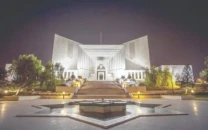Green courts: SC judge for better monitoring of presiding officers
Justice Jamali highlights the importance of spreading awareness about the environment.

Justice Jamali advises the trainee judges to “adopt a balanced and a pragmatic approach to tackle the issues arising out of Intellectual Property Laws.” PHOTO:FILE
Naming environmental courts as green courts is not enough. Our focus should be on monitoring the conduct of their presiding officers, who run the affairs.
This was said by Justice Anwar Zaheer Jamali of the Supreme Court at the inauguration of a week-long training course for 21 district, additional district and session judges from all over Pakistan here on Monday, said a press release.
The training will be held in the Federal Judicial Academy (FJA) and will focus on Intellectual Property (IP) Laws and Environmental Laws, with special reference to jurisdiction and powers of green courts and other new laws.
“It is not the gun, but the man behind the gun who matters,” he said.
Justice Jamali also stressed on the importance of creating awareness and educating the masses about environmental problems. Nowadays seminars, workshops and walks on environmental issues are being regularly organised, but there is greater need for more education and awareness, he said.
He lamented the already existing environmental laws and tribunals, saying that the laws are archaic and the tribunals work only “on the record”, with no real performance.
Environment, he said, “is important for human interest litigation and hence it is imperative for district judiciary judges to enforce environmental laws.”
Justice Jamali also highlighted the effectiveness of environmental courts in economies such as China, Japan, Korea and Taiwan. Efforts such as last year’s South Asian Conference on Environmental Justice and the Bhurban Declaration in 2012 should be intensified, he said.
IP laws, he said, are needed to curb piracy. “Intellectual Property Laws are not made to exploit the poor of the developing and third world countries, such as Pakistan, but are there to protect and safeguard their rights.”
He advised the trainee judges to “adopt a balanced and a pragmatic approach to tackle the issues arising out of Intellectual Property Laws.”
Published in The Express Tribune, January 15th, 2013.



















COMMENTS
Comments are moderated and generally will be posted if they are on-topic and not abusive.
For more information, please see our Comments FAQ